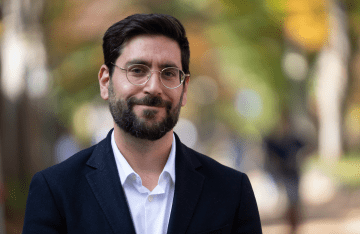Zelizer Delivers Plenary Keynote on Al Jazeera and Media Freedom in Crisis, Outlines New Center for Media at Risk
The new center will help monitor and sustain a free and critical global media environment.
Watch Zelizer's keynote address.
Journalism should be independent, transparent, unbiased, incorruptible, socially useful — a shiny marble pillar upholding the ideals of democracy.
Ideally, yes. But in reality, the fourth estate is part of a complicated and imperfect world. Journalism exists in stable democracies, fully authoritarian states, and everything in between. Media institutions are inextricably tied to politics, economics, law, education, security, religion, and the military.
Holding journalists to unrealistic ideals, says Barbie Zelizer, the Raymond Williams Professor of Communication at the Annenberg School for Communication, is a failure in thinking, and one that is happening during one of the worst periods for journalism in contemporary memory.
Zelizer spoke on this topic earlier today in her plenary keynote address, “Al Jazeera: Putting Journalistic Ideals Back in the Service of Practice,” at a conference in Doha, Qatar organized by the National Human Rights Committee of the State of Qatar, the International Federation of Journalists, and the International Institute of Journalism.
The conference, entitled “Freedom of Expression: Facing up to the Threat,” focused on violations of freedom of opinion and expression, the challenges to international human rights law caused by communication technology, harassment of journalists, and protecting journalists in conflict areas, and hate speech.
The subject is particularly resonant in Qatar, home to Al Jazeera, which recently came under fire in a dispute with Saudi Arabia. Despite being a pioneering news outlet in the Middle East in so many ways, Zelizer argued that outsiders are judging Al Jazeera by an unreasonably ideal yardstick, as evidenced by the West’s underwhelming outrage to the Saudi demands to shutter the network.
“The West’s tepid response — specifically persons in the US and UK calling for the parties to resolve the dispute internally – muted journalism’s necessary role in circulating information, even if and when its relay gets muddied,” said Zelizer. “If there were ever a time to realign the abstract ideals proclaiming journalism’s value with its less than perfect ground conditions, that time is now.”
Rather than continuing to cling to an unrealistic vision for journalism, Zelizer urged the audience to recognize that ideals need to “get dirty from time to time” as a means to solve real world problems.
In her speech, Zelizer also outlined an upcoming effort to combat the demonizing of journalism. In Spring 2018, Zelizer will be launching the Center for Media at Risk at the Annenberg School.
“The Center will provide a hub to help monitor and sustain a free and critical global media environment,” said Zelizer, “by creating a register of the mechanisms of political intimidation that undermine the news, documentary and entertainment in multiple locations around the globe.”
The Center for Media at Risk will be partnering with a network of programs at Penn, outside academic institutions, and media organizations invested in the free flow of information worldwide. It will house visiting scholars and media practitioners involved with or affected by risk and host regular symposia and speakers that delve into the challenges to a free and critical media in the current environment.
In her keynote, Zelizer also made three suggestions to the audience, which included 200 participants, as well as international and regional non-governmental organizations in the field of human rights, media institutions, researchers, policy experts, research centers, treaty body experts, a group of special rapporteurs of the UN system, regional systems, representatives of the UN High Commissioner for Human Rights, UNESCO, the Organization for Security and Co-operation in Europe (OSCE), World and National Associations of Journalists and a number of global personalities.
First, she suggested that our discussions of journalism focus on its strengths and weaknesses as it practically exists today, rather than how it ought to exist in some ideal. By considering the different forms journalism takes around the world, we can more accurately understand the risks to it.
Secondly, Zelizer encouraged more dialogue among journalists and journalism scholars and advocates, across various in-person and online formats.
Finally, Zelizer urged the audience to be proactive rather than reactive in responding to the authoritarianism that has been creeping into the news.
“We need to make our ideals work for journalism again,” she concluded, “not the other way around.”
For those interested in learning more about the Center for Media at Risk, please contact Barbie Zelizer at barbie.zelizer@asc.upenn.edu or Emily Plowman at emily.plowman@asc.upenn.edu.



